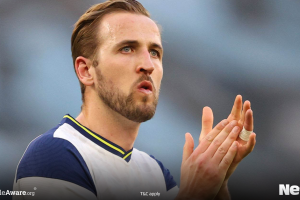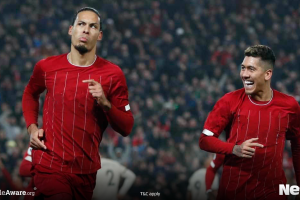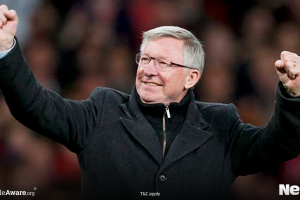There are similarities between football and music. Both are social and emotional kinds of opium; the kind of addiction that society finds acceptable.
Both fields provide brilliant escapism from the real world and its harshness; sometimes all you need to take your mind off things to pour them into a Susan Christie album, or into watching Crystal Palace smash Liverpool’s title hopes to bits.
And for both fields, the element of subjectivity is permanent. It’s hard to determine what’s better than what. How’s this song better than that song; what makes this player/club/match unequivocally better than another? There’s no real metric, it all rests on perspective.
If this seems like a cop-out for what’s coming next, that’s because it probably is.
Selecting a list of players to rank for a particular organisation for all time is something that will always be subject to debate, and it will always be as questionable as it is understandable.
So, at the risk of incoming criticism, here’s a rundown of Nigeria’s best footballers of all time.
10. Ahmed Musa
Recency bias? Probably. Ahmed Musa will probably spring to mind for younger generation Nigerians for something like this, as he will be discarded by older heads, which is understandable.
But you can’t knock his time with the Super Eagles. 91 games and 15 goals don’t quite tell the story of a player whose job also goes beyond the stats, and can sometimes seem like a get-out-of-jail card for the Super Eagles.
At 28, there’s still a bit more to come from him.
9. Daniel Amokachi
The stats won’t do Amokachi justice; 14 for the Eagles; while in his club career, he averaged just eight league goals per year. Yet, there’s a reason why ‘The Bull’ was so revered, not just because his style of play gave defenders a hard time, but also because he was a master at bringing others into play.
Sometimes, he seemed like a sheer force of will. Other times, like a fleet-footed man who dazzled the audience.
8. Emmanuel Amuneke
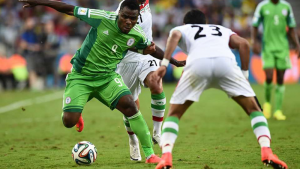
If anyone insinuating that he was the best player in the world sometime in the mid-90s was outlandish, it was also testament to his ability as a footballer.
Just 27 appearances for Nigeria might just raise your eyebrow, but the fact that he averaged a goal every three games is more than impressive.
Add in the CAF best player award in 1994, and the BBC African footballer award two years after, perhaps he should be higher on this list.
7. Joseph Yobo
Yobo’s international career – and club career – may have ultimately petered out a bit in the end, but that shouldn’t dilute his achievements with his national team.
No one has more caps for the country than him (101 – although he shares the record), and only fitness issues denied him making more appearances.
His versatility and tactical awareness explains why he was able to start off at right-back and slot in seamlessly into the centre-back position, and lifting the AFCON as captain in 2013 – despite not featuring regularly – was a feather in his cap.
6. Rasheed Yekini
Unmatched for goals for the Super Eagles, not many players will scream ‘underrated’ like Yekini.
The honour of scoring Nigeria’s first ever World Cup goal in 1994 was befitting for a man who at that had bagged two CAF best player awards, and torn apart defences in Nigeria, Ivory Coast and Portugal.
And for memories, it’s impossible to think of Yekini and not picture him holding the net in celebration in ’94.
5. Kanu Nwankwo
The silkiness of Kanu was so palpable, that European football couldn’t classify him into the African footballer stereotype of ‘pace and power’.
Kanu had a kind of nonchalant brilliance about himself, the ability to glide through football matches with grace, he seemed almost inexplicable.
That he never scored a goal in the Nations Cup is glaring, but he almost more than makes up for it with his extra-time double against Brazil in that game in 1996.
4. Vincent Enyeama
You have to be real good to be a goalkeeper that’s voted as the best player in an entire league campaign. And Enyeama was.
At 5’11, he was never the biggest presence in goal, but if that meant opposition players underestimated him, then surely they’d have regretted that.
Joint-top for number of Super Eagles caps, it’s hardly any gain that Enyeama made Nigeria get away with a lot lapses, and perhaps the biggest indicator of his quality is how the Super Eagles have struggled to replace him since.
3. Jay-Jay Okocha
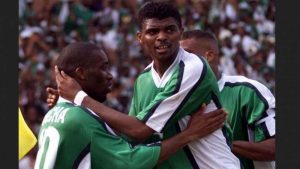
The accusation towards Okocha is that he’s not quite tactically disciplined, and he was mostly a luxury player. That may have some truth, but there’s a reason they said he was ‘so good, they named him twice’.
It wasn’t just that Pele named among the 125 greatest players in 2004, or that he was dubbed the 12th greatest African footballer of the last 50 years by BBC in 2007.
It was that Okocha epitomised the appreciation of the game; watching him was always a joy. It was that Okocha was good enough for rumours of ‘he taught Ronaldinho at PSG’ to see the light of day, and that he achieved cult hero status at basically everywhere he went.
2. Muda Lawal
For many, football was communal, the point of it was the sense of community around the game and not the money that continuously threatens to ruin it for good.
And not many players around the world will embody that sense like Muda Lawal, a legend with Shooting Stars and the national team, who crowned that with an African Cup of Nations tournament on home soil in 1980.
Not many Nigerian players have places named after them, but the fact that 86-cap winning, African Cup Winners Cup champion of 1975 has a stadium in Abeokuta named after him speaks volumes.
But it goes beyond that for Muda Lawal. It’s also the issue of the legacy he birthed, how tales of him were almost mythical; Muda could move mountains, could turn games around by his sheer presence; they may sound like fallacy, but the fact that those words could be uttered, that those thoughts could be entertained, said something. Listen to people who witnessed him play talk about him – partly in awe and admiration and partly in sympathy for you couldn’t see him strut his stuff – and you’d get the idea.
1. John Obi Mikel

Yes, really. Of course you have every right to see this and colour me deranged, and ask whether football was invented in 2006.
It’s all understandable, Mikel won 91 caps for the Super Eagles, and was never glamorous enough for his on-pitch actions to live in the memory.
But there has always been something about Nigerian football that makes it easy for you to be cast out, or eased out. It only takes one decision, one moment of madness, or one glaringly underwhelming display, and your
international career will reach its end, just ask Yakubu.
But Mikel stood that test of time, and in an age when it’s easy to get burned by Nigeria, was almost unyielding. There were the notable moments when it seemed like his time hit a brick wall, but the former Chelsea man will always deserve more credit than he’ll get, playing despite personal and professional adversities, and ultimately ending his Super Eagles career on his own terms.
Throw in some European and English club titles for good measure, and you’ll understand why Middlesbrough fans called him a ‘Rolls Royce’ of a player.

